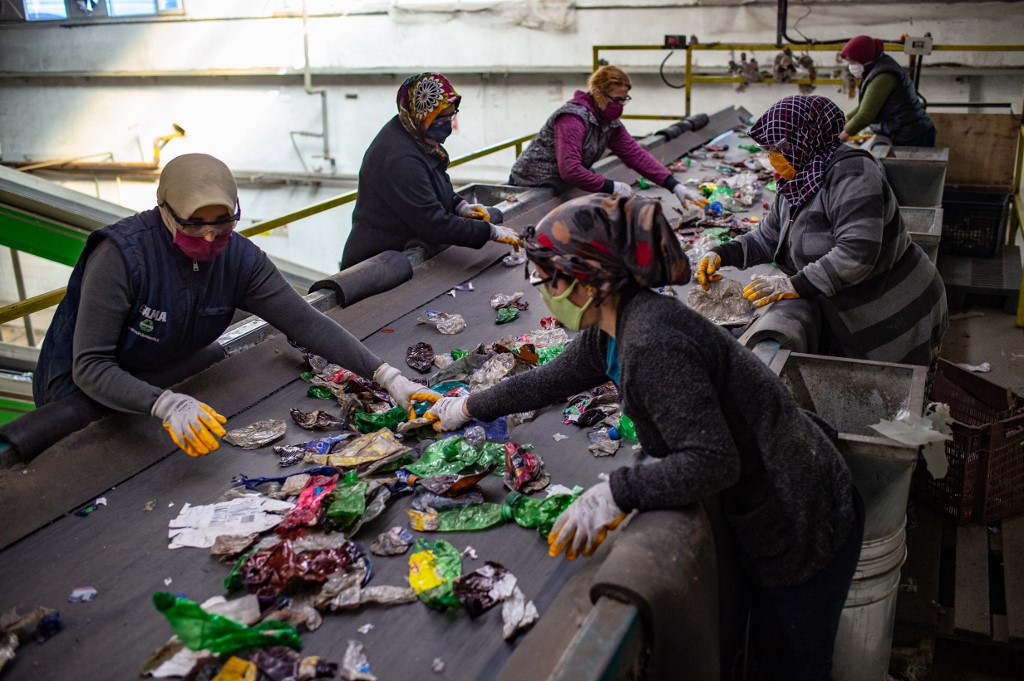Turkish President Recep Tayyip Erdoğan highlighted the significance of Turkey’s “Zero Waste” initiative at a recent climate summit in Azerbaijan, yet the country leads in plastic waste imports from Europe and may not be able to manage recycling the material effectively.
In his speech at the 2024 United Nations Climate Change Conference or Conference of the Parties of the United Nations Framework Convention on Climate Change, more commonly known as COP29, Erdoğan emphasized his “Zero Waste” initiative, which aims to reduce and control waste nationwide in alignment with sustainable development goals.
Launched by his wife, Emine Erdoğan, the program set ambitious targets, including recycling 60 percent of all recyclable waste by 2035 and increasing the recycling rate of packaging materials to 65 percent by 2026.
Turkey is the leading destination for European plastic waste. In 2023, European Union countries and the United Kingdom shipped 456,507 tons of plastic waste to Turkey, equivalent to the load of about 125 garbage trucks, daily. Over the past 17 years, Turkey’s plastic waste imports have surged 155-fold.
According to a recent BBC Turkish report, based on Greenpeace International’s latest findings, Turkey has ranked as the leading importer of plastic waste from European countries over the past five years. Citing Eurostat and United Nations Comtrade data, Greenpeace Turkey noted the top waste exporters to Turkey: the United Kingdom (140,907 tons), Germany (87,109 tons), Belgium (74,141 tons), Italy (41,580 tons) and the Netherlands (27,564 tons).
Speaking to BBC, Professor Sedat Gündoğdu, from Çukurova University’s Fisheries Department, said Turkey imports plastic waste beyond its ability to manage.
“The Turkish Plastics Industry Foundation (PAGEV) estimates Turkey imported 623,000 tons of plastics under the 3915 code — which they call raw materials or recyclable waste, though it is essentially trash. Annually, we handle 600,000 to 700,000 tons, surpassing Turkey’s domestic collection capacity,” Gündoğdu was quoted as saying.
Environment and Urbanization Minister Murat Kurum defended Turkey’s waste import policies, citing the domestic recycling industry’s need for raw material, and said restrictions had been imposed on plastic waste imports. The minister added that Turkey ultimately aims to eliminate such imports entirely.
Following public outcry, Turkey announced a ban on plastic waste imports, published in the Official Gazette on May 18, 2021, to take effect after a 45-day transition period. However, the ministry of trade reversed the ban with a notification published on July 10. Gündoğdu noted that the seven-day restriction impacted Turkey’s annual waste import figures, with 2021 showing the lowest level of plastic waste imports in five years.
“Our field investigations revealed irreversible contamination of Turkey’s soil, air and water from plastic waste imports.” She added, “A complete ban could significantly mitigate this danger,” Nihan Temiz Ataş, Greenpeace Turkey’s plastic campaigner, told the BBC.
Turkey’s imported plastic undergoes mechanical recycling, with 40 to 60 percent becoming residual waste, Gündoğdu explained. Only 200,000 to 250,000 tons of usable raw material emerges from Turkey’s annual 600,000-ton plastic waste import total, mostly used for low-grade products like trash bags, shoe soles, and car parts.
Greenpeace investigations in 2019 of illegal plastic waste deposits in Adana revealed high levels of dioxins and furans, both known carcinogens, in ash, water, and riverbed sludge samples. Gündoğdu added that significant microplastic pollution flows into the Mediterranean Sea via the Seyhan River, making the Gulf of Mersin one of Turkey’s most polluted regions.
As Erdoğan promotes the “Zero Waste” initiative, Turkey faces challenges in reconciling its recycling goals with its role as a major importer of plastic waste, a duality that has significant environmental implications.



